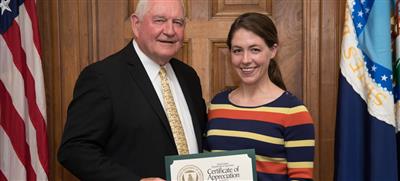BOZEMAN — A Montana State University graduate student who once picked rocks and cut thistle heads on her family's farm and now researches wheat genes recently returned from another round of meetings with national ag leaders.
Emma Jobson, 25, was one of 10 national graduate students and 20 undergraduates who were selected for a weeklong trip to Washington, D.C., through the U.S. Department of Agriculture's Student Diversity Program. She was the only student from Montana selected to attend. Last year, Jobson participated in a similar program offered by the Agricultural Tri-Societies.
“I would encourage other graduate students to apply for
Jobson — who also applied for and was selected to speak March 13 at the Nebraska Plant Breeding Symposium in Lincoln — is working toward her Ph.D. in plant genetics, hoping that her work will benefit farmers raising wheat under increasingly arid conditions.
Jobson was chosen for the USDA forum based on an essay she wrote and a letter of recommendation from professor Mike Giroux, her adviser and interim head of the Department of Plant Sciences and Plant Pathology in MSU's College of Agriculture. Her essay addressed the significant challenges of feeding the planet’s more than 10 billion people with depleted resources.
“Emma stands out because of her dedication to global food security and taking advantage of opportunities to expand her network and professional development on a national scale,” Giroux said. “I know those traits will serve her well in the future.”
The 30 students who were selected for the February forum came from land-grant universities like MSU, Hispanic-serving institutions and non-land-grant colleges of agriculture. While in Washington, D.C., they learned about contemporary agribusiness, scientific research
Besides meeting current ag leaders and mingling with future ag leaders, Jobson met with the director of the USDA program that funds her research in Giroux's laboratory. Jobson's research is currently funded by a $244,618 grant titled “Wheat Yield and Quality Improvement via Testing of New Semi-Dwarf Alleles.” The USDA grant was made possible by preliminary results obtained with funding provided by the Montana Wheat and Barley Committee.
During her final two days in Washington, D.C., Jobson attended the USDA's largest annual meeting, the Agricultural Outlook Forum.
“These students are the next generation of agriculture, and it is important for the USDA to support their training as future agriculture professionals,” USDA Chief Economist Robert Johansson said in a press release before the event.
Jobson — whose ancestors farmed in Sweden and continued farming after immigrating to the United States — grew up on a corn and soybean farm near Fort Collins, Colorado. Her mother and uncle also manage farms in Colorado, Nebraska
Because of that background and the fact that she conducts research funded by the USDA's National Institute of Food and Agriculture, she was already familiar with many areas of agriculture, Jobson said. The USDA program and forum exposed her to commodities and rural development, however. Speakers also discussed food safety, government regulations, the need for higher yields and the challenges of developing crops to feed a growing population.
“I think it's really been


